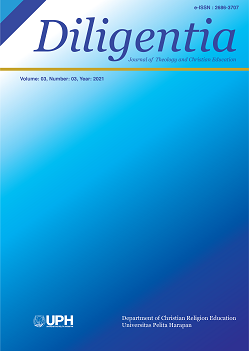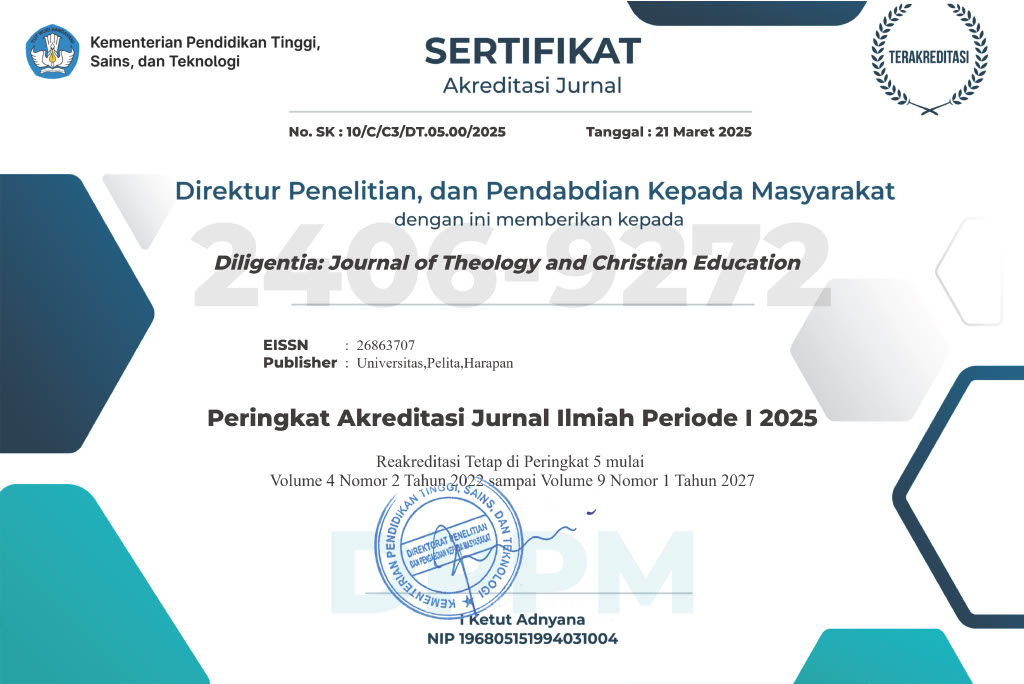Evaluasi Program Professional Development di TK-SD XYZ Menggunakan Konsep Trilogi Kualitas Ditinjau dari Perspektif Alkitabiah [An Evaluation of The Professional Development Programme in XYZ Kindergarten and Primary Using the Concept of The Trilogy of Quality Viewed From The Biblical Perspective]
DOI:
https://doi.org/10.19166/dil.v3i3.3272Keywords:
Professional Development, Manajemen Mutu, Quality Planning, Quality Control, Quality Improvement, Distance LearningAbstract
Covid-19 brings a significant change in education practice. Due to school closure during the pandemic, teachers must adapt to distance learning implementation. Even in the abrupt change, schools must maintain the quality of education. The previous research proves that Professional development plays a significant role in improving teacher’s competency and performance. As front liner in the education field, improvement of teacher’s competencies and performance will impact the quality of the school. In this essay, professional development during the pandemic situation in TK-SD XYZ will be evaluated using The Juran Trilogy. First, The Juran Trilogy is analyzed using systematic theology approached. The result illustrated that The Juran Trilogy is linier with biblical Christian worldview. The purpose of this evaluation is to ensure how TK-SD XYZ performs quality management practice to maintain its quality during the pandemic situation. This evaluation finds that TK-SD XYZ has applied The Juran Trilogy concept. The practice of quality management in the professional development program in TK-SD XYZ brings a positive impact in increasing customer satisfaction in distance learning practice.
References
Asio, John Mark R., and Shallimar A. Bayucca. “Spearheading Education During the COVID-19 Rife: Administrators’ Level of Digital Competence and Schools’ Readiness on Distance Learning.” Pedagogical Sociology and Psychology 3, no. 1 (2021): 19-26. https://doi.org/10.33902/JPSP.2021364728
Azzahra, Nadia Fairuza. “Addressing Distance Learning Barriers in Indonesia Amid the Covid-19 Pandemic.” Centre for Indonesian Policy Studies 2 (2020): 1-8. https://doi.org/10.35497/309162
Bavinck, Herman. Reformed Dogmatics. Grand Rapids, MI: Baker Publishing Group, 2011.
Brummelen, Harro Van. Walking with God in the Classroom: Christian Approaches to Teaching and Learning. 3rd ed. Colorado Springs, CO: Purposeful Design Publications, 2009.
Darling-Hammond, L., Hyer, M.E., and Gardner, M. “Effective Teacher Professional Development” Research Brief June (2017): 1-8.
Estep, James R., Michael J. Anthony, and Greg R. Allison. A Theology for Christian Education. Nashville, TN: B & H Publishing Group, 2008.
Evans, Roderick L. The Doctrine of Sanctification: Understanding Sanctification and Holiness in the Christian Life. Camden, NC: Abundant Truth Publishing, 2012.
Grudem, Wayne. Systematic Theology : Introduction to Biblical Doctrine. Grand Rapids, MI: InterVarsity Press, 1994.
Hodge, Charles. Systematic Theology. Grand Rapids, MI: Christians Classics Ethereal Library, 2005.
Juran, J. M. “The Quality Trilogy” Quality Progress 19, no. 8 (1986): 19-24. https://doi.org/10.4135/9781483346366.n176
Juran, J. M., Blanton Godfrey, Robert E. Hoogstoel, and Edward G. Schilling. “Juran’s Quality Handbook” Training for Quality 1 (1999).
Sallis, Edward. Total Quality Management in Education. 3rd ed. London, UK: Kogan Page, 2002.
Susanto, Ahmad. Manajemen Peningkatan Kinerja Guru. Depok, Indonesia: Prenadamedia Group, 2016.
Tung, Khoe Yao, Filsafat Pendidikan Kristen. Yogyakarta, Indonesia: ANDI, 2013.
Downloads
Published
How to Cite
Issue
Section
License
Authors who publish with this journal agree to the following terms:
1) Authors retain copyright and grant the journal right of first publication with the work simultaneously licensed under a Creative Commons Attribution License (CC-BY-SA 4.0) that allows others to share the work with an acknowledgement of the work's authorship and initial publication in this journal.
2) Authors are able to enter into separate, additional contractual arrangements for the non-exclusive distribution of the journal's published version of the work (e.g., post it to an institutional repository or publish it in a book), with an acknowledgement of its initial publication in this journal.
3) Authors are permitted and encouraged to post their work online (e.g., in institutional repositories or on their website). The final published PDF should be used and bibliographic details that credit the publication in this journal should be included














